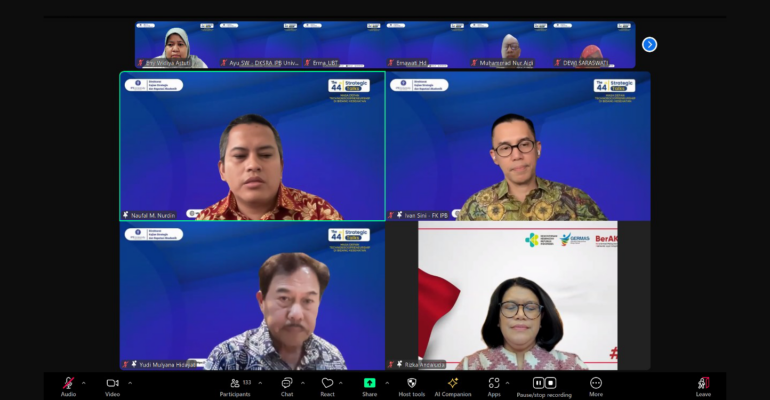DKSRA IPB University Holds Strategic Talks, Reveals the Future of Techno-Sociopreneurship in the Health Sector

The global health sector is undergoing a massive transformation amid rapid technological advances. In Indonesia, the need for more effective, efficient, and affordable health solutions encourages the emergence of technopreneurship as an important pillar in answering the existing challenges.
Technopreneurship, which is a combination of technology and entrepreneurship, has opened up new opportunities for innovators to develop products and services that can improve people’s quality of life.
In order to address these developments, the Directorate of Strategic Studies and Academic Reputation (DKSRA) of IPB University organised The 44th Strategic Talks with the theme ‘The Future of Techno-Sociopreneurship in the Health Sector’, Tuesday (20/8). The event presented leading experts in the field of health who discussed the challenges and opportunities of techno-sociopreneurship in improving the quality of health services in Indonesia.
Director of KSRA IPB University, Prof Anuraga Jayanegara in his opening highlighted the importance of this event as an effort to dig deeper into the potential of technosociopreneurship in facing health challenges in the digital era. “This event is expected to be a productive discussion forum and pave the way for the creation of innovations that can have a positive impact on society,” said Prof Anuraga.
The first speaker, Dean of the Faculty of Medicine of IPB University, Dr Ivan Rizal Sini, GDRM, MMIS, FRANZCOG, SpOG, explained the importance of technology integration in education and health services. “Medical education must adapt to technological developments to produce medical personnel who are ready to face future health challenges,” he said.
Medical education, he continued, should not only focus on self-development and competence of doctors, but also on the needs and satisfaction of patients (customer needs and customer satisfaction). “By adopting a techno-sociopreneurship approach, we can create innovative and sustainable solutions to improve the quality of health services,” said Dr Ivan.
On that occasion, Prof Yudi Mulyana Hidayat, dr SpOG(K)-Onk, DMAS, Dean of the Faculty of Medicine, Universitas Padjadjaran, discussed the role of techno-sociopreneurship in supporting cancer therapy research and development. “Innovation in oncology requires close collaboration between technology and social business models. Techno-sociopreneurship enables the development of therapies that are not only effective, but also affordable and accessible to all levels of society,” he said.
According to him, one of the challenges for medical personnel in Indonesia is the issue of wages, which can have an impact on many things. He believes that technopreneurship can answer this problem. “Entrepreneurship is not DNA, everyone has the ability to think analytically. The basic concept of entrepreneurship can be introduced at the beginning, to support the development of the cognitive abilities of the medical profession. We must start to build an entrepreneurial spirit in medical students,” said Prof Yudi.
In closing, Dr Dra L Rizka Andalucia, Apt, MPharm, MARS, Director General of Pharmaceuticals and Medical Devices of the Indonesian Ministry of Health (Kemenkes), also gave her views on government regulations and policies that support techno sociopreneurship in the health sector.
Dr Rizka said, “The government is committed to creating a conducive environment for the development of techno-sociopreneurship. The right policies will encourage innovation in the health sector, ensuring that the technologies developed can be implemented effectively and safely.”
“Health is an important factor in realising the Golden Indonesia 2045, creating healthy, superior, and competitive Indonesians by strengthening primary care and healthcare systems,” he continued.
In the discussion led by Dr Naufal Muharam Nurdin as moderator, it was discussed how techno-sociopreneurship can contribute to equitable access to health services in remote areas.
“The key question that needs to be answered is how to ensure techno-sociopreneurship innovations really answer the needs of the community, especially in remote areas. Collaboration between the government, academia, and industry is needed to create a supportive ecosystem so that this innovation has a real and broad impact,” said Dr Naufal, a lecturer at the Faculty of Medicine, IPB University.
The discussion that took place during this event concluded that entrepreneurship is not something that is tied to genetics; everyone has the potential to think analytically. Therefore, the basic concepts of entrepreneurship can be taught to support the development of cognitive abilities that are essential for the medical profession.
In addition, the discussion also resulted in an agreement that techno-sociopreneurship is the future that should be encouraged in the health sector. The speakers agreed that technological innovation combined with the spirit of social entrepreneurship will be the key in answering various challenges in the health sector, ranging from accessibility to service effectiveness.
The 44th Strategic Talks is one of IPB University’s concrete steps in encouraging the development of techno-sociopreneurship in Indonesia. By presenting leading experts and practitioners, this event is expected to provide new insights and inspiration for participants to continue to innovate in the health sector. (*/Rz) (IAAS/RUM)



